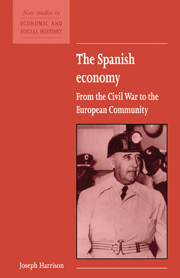Book contents
- Frontmatter
- Contents
- List of tables
- Acknowledgements
- Map of Spain
- 1 Backwardness and progress, 1900–36
- 2 An outline of economic development since the Civil War
- 3 Demographic developments
- 4 Agriculture
- 5 Industry
- 6 Energy
- 7 The service sector
- 8 Foreign trade
- 9 The financial system
- Concluding remarks
- Bibliography
- Index
- More Titles in the New Studies in Economic and Social History series
9 - The financial system
Published online by Cambridge University Press: 05 June 2012
- Frontmatter
- Contents
- List of tables
- Acknowledgements
- Map of Spain
- 1 Backwardness and progress, 1900–36
- 2 An outline of economic development since the Civil War
- 3 Demographic developments
- 4 Agriculture
- 5 Industry
- 6 Energy
- 7 The service sector
- 8 Foreign trade
- 9 The financial system
- Concluding remarks
- Bibliography
- Index
- More Titles in the New Studies in Economic and Social History series
Summary
Financial reconstitution, cheap money and the status quo
One of the most pressing tasks confronting the victorious Franco regime in April 1939 was the reconstitution of Spain's financial system, split into two by the Civil War. During the conflict, the monetary authorities in both zones resorted to a variety of devices to pay for their costly campaigns. From the beginning, the Republican government attempted to bring in as much revenue as possible for its war effort by the sale of treasury bills. However, after two years of unbridled inflation, its citizens were unwilling to subscribe to official issues bearing low rates of interest. Hence, the Republican Exchequer came to depend to a large extent on loans from the Bank of Spain. In his authoritative contribution to the Bank of Spain's official history, published in 1970, Juan Sardà shows, by reference to the institution's balance sheets, that during the Civil War the so-called red Treasury borrowed as much as 22,740 million pesetas from its central bank. More revealingly, the same author describes how in November 1936, when the rebel forces were on the outskirts of Madrid, Finance Minister Juan Negrín authorised the transfer of Spain's gold reserves, valued at approximately $500 million, from the vaults of the Bank of Spain to the Soviet Union for safekeeping.
- Type
- Chapter
- Information
- The Spanish EconomyFrom the Civil War to the European Community, pp. 60 - 66Publisher: Cambridge University PressPrint publication year: 1995

